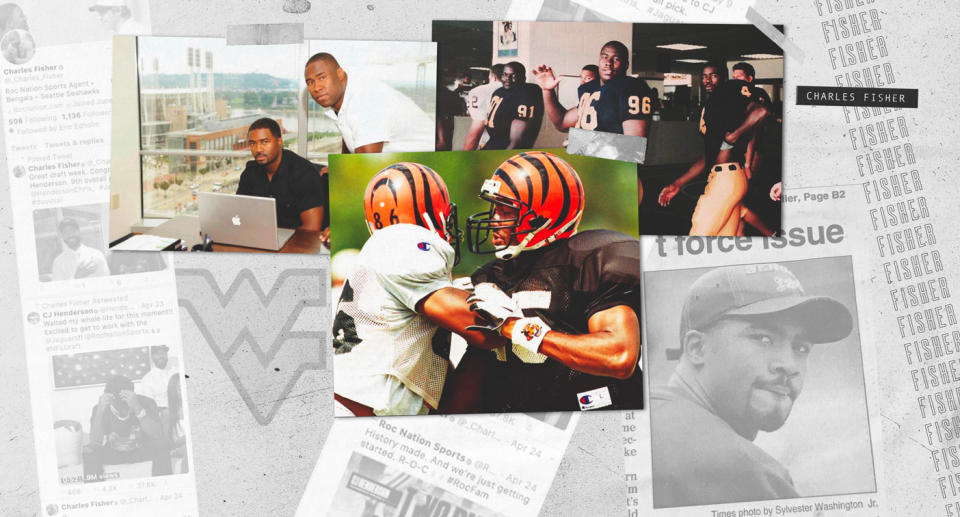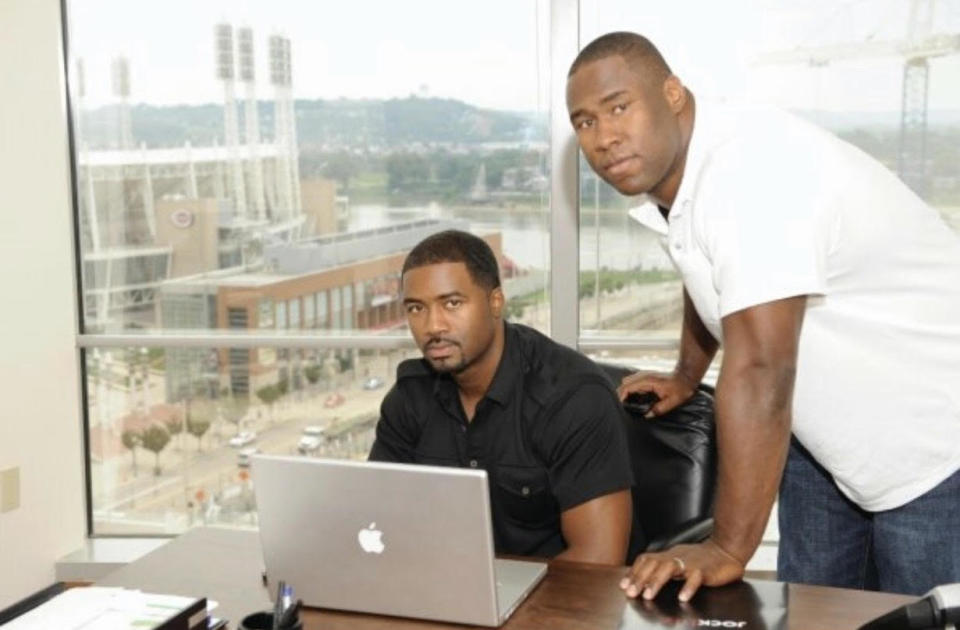Moment of Glory: Charles Fisher's NFL career lasted 14 plays. But the scout-turned-agent found a new calling
Charles Fisher walked into Adelphia Coliseum on Sept. 12, 1999, with his entire NFL life ahead of him.
A second-rounder of the Cincinnati Bengals that April, Fisher won the starting cornerback job, the last Opening Day rookie starter for legendary defensive coordinator Dick LeBeau for the next 15 NFL seasons. Considering Fisher hadn’t even started the opener as a senior for West Virginia one year earlier, it was a stunning rise.
Across the field was Fisher’s college teammate and roommate and one of his best friends, John Thornton, with whom Fisher later would go into business. Thornton was drafted by the Tennessee Titans 19 picks after Fisher that same year.
In the stands were Thornton’s and Fisher’s parents, who stayed together that weekend, to witness their NFL debuts. Fisher allowed himself a moment before kickoff to soak it up, knowing how far he’d come.
Less than an hour later, Fisher’s playing career was effectively over. It would take him years to figure out how to reimagine his football dreams.

The next Aliquippa great
Fisher was raised in football-swathed Aliquippa, Pennsylvania, a once-thriving Pittsburgh suburb that rose in the early 20th century with the burgeoning steel industry but crashed when the mills closed and jobs were lost by the tens of thousands.
Aliquippa — home of the “Fighting Quips” — is also some of the country’s most football-rich soil. A town that size (current population: 9,000) produced greats such as Mike Ditka, Tony Dorsett, Ty Law, Sean Gilbert, Darrelle Revis and Paul Posluszny. Fisher’s grandfather, Ernie Pitts, the first NFL draft pick from Aliquippa and a four-time CFL Grey Cup champion, also made the notable list.
Fisher followed NFL players who came from his area. His guys, he said. Aliquippa guys.
“It was a tough town. Still is,” Fisher said. “I wanted to be the next guy to make it from there.”
Fisher became part of this tradition, but it took some trials. Heading into his final year at West Virginia in 1998, he had been shuttled back and forth between receiver and DB and was set back by a thigh injury as a junior in 1997. If he wanted to become the next Law — the player he most emulated coming up — Fisher needed a big final year.

Fisher picked off three passes his final year, playing his best football and earning a Senior Bowl invite. There, Fisher blanketed Torry Holt, the eventual No. 6 pick in the draft. Fisher soon heard his name mentioned in the same breath as other 1999 draft DB prospects such as Champ Bailey, Antoine Winfield, Chris McAlister and Dre’ Bly.
The Bengals drafted Fisher 33rd overall a round after picking QB Akili Smith third overall. Cincinnati was in full rebuild mode, but Fisher was overjoyed.
“We were the guys who were going to help turn this thing around,” he said. “I relished that.”
The brutal injury — and the painful aftermath
Starting at left corner against the Titans in Week 1, Fisher faced a team led by Steve McNair, Eddie George and Kevin Dyson that would end up in the Super Bowl that season. Thornton knew his college teammate would have a target on his back.
“Kevin Dyson and Yancy Thigpen came to me all week saying, ‘Yo, we’re going after your boy,’” Thornton said. “They were licking their chops to face a rookie.”
LeBeau believed in the 23-year-old Fisher, the last Week 1 rookie to start for him until Ryan Shazier with the Steelers in 2014. Fisher and LeBeau had quickly formed a bond.
“He was always trying to push the right buttons to get you to understand what you needed to do,” Fisher said. “He always told me to come in and work like you’re the starter, so that’s what I tried to do.”
After Thigpen drew a PI flag against Fisher on the first play from scrimmage, he settled in. In fact, the Titans threw away from Fisher most of the next three series.
And then it happened, the play that changed Fisher’s life.
The Titans and Bengals were tied 7-7, with Tennessee at the Cincinnati 13-yard line ear the end of the first quarter. Fisher saw the Titans’ formation and McNair’s hand signal and knew the ball was coming his way. “Kevin Dyson ran an in-cut, and he was going to cut right back out,” Fisher said.
“The only thing in my head is , ‘I am about to pick this off.’ I knew exactly what was coming. I just said in my head, ‘Wow, this is amazing.’”
Just as Dyson cut out the way Fisher knew he would, Fisher planted his leg to drive on the route. Something gave, and Fisher crumpled over in intense pain. A wide-open Dyson caught the ball and scored. LeBeau asked over the headset: “Where’s Charles?”

No one — including Fisher — seemed to know what had happened.
“My knee just gave out,” he said. “There was really nothing abnormal about the play. It was one of those super-freaky accidents.”
Moments after he fell, Fisher popped his dislocated knee back into place. He’d later find out that he suffered a torn ACL, MCL and PCL. Thornton sunk when he saw his friend leave the field.

“They carted him off right past our bench,” Thornton said. “I couldn’t believe how quickly his first game ended.”
It would be the final time Fisher played a snap in the NFL.
Road to recovery led to another path
Fisher was on IR, shelved the entire 1999 season. He expected to work his way back into the starting job he’d earned, but the knee injury was serious enough to also cost him the 2000 season.
“They told me later that my leg was a little too strong, so it was like a .22 being shot off in my leg,” he said.
At some point that year, Fisher read about the injury in the local newspapers. What he saw shocked him.
“It didn’t really occur to me that I wouldn’t be able to come back,” Fisher said. “But then I read in the paper that the injury could be career-threatening, it was like, ‘Oh, wow.’ The Bengals never said that, but it was out there.”
Undaunted, Fisher thought he had made it fully back by minicamps in May 2001. He was practicing and felt great. Bengals cornerbacks coach Kevin Coyle saw Fisher, delivering the first good news in what seemed like forever.
“He told me I could get my starting job back,” Fisher said. “He said, ‘You’ve earned it.’”
Fisher felt validated for his the grueling rehab in a 20-month struggle. That elation lasted about one hour.
That’s when Bengals director of football operations Jim Lippincott delivered news that Coyle apparently wasn’t privy to: They were cutting Fisher that day.
“So I went from, ‘You’ve earned it,’ and getting my starting job back to an hour later getting cut,” Fisher said. “That was quite an hour.”
Fisher was still bent on playing. He had tryouts from multiple teams, including what he thought was an offer from the New Orleans Saints. Nothing materialized.
Fisher was faced with a decision: keep the dream alive or cash in on a loss-of-value insurance policy from Lloyd’s of London that would pay out $1 million. He chose the latter. Fisher’s NFL career officially ended after 14 regular-season snaps.
After spending time traveling, Fisher was ready to get back into football. He sent letters to all 32 teams looking for opportunities in scouting, even offering to work for free.
The Green Bay Packers invited him to training camp in 2002, making Fisher a scouting intern. “I loved it,” Fisher said. “It felt right.”
That led to a full-time gig as an area scout for the Seattle Seahawks. He performed the job from 2003-09, eventually earning the respect of the veteran staff. Fisher especially felt like his colleagues appreciated his input on DBs, often tasking him to cross-check the position.
Over time, Fisher felt scouting might have been a dead end.
“I didn’t feel that I was being groomed into anything but a scout,” Fisher said. “I was starting to question whether there might be something else.”
That’s when he recalled one life-changing conversation with his old friend.

‘Wait, what did you just say to me?’
Thornton enjoyed a long NFL career, playing 10 seasons with the Titans and Bengals. Around 2005, he and Fisher, still a Seahawks scout, caught up by phone.
Thornton cycled through four agents in his career, and he told Fisher he’d recently fired one of them. That meant Thornton had to cut a check for $120,000 — 3 percent of a $4 million deal — to his former rep.
The call ended but Thornton’s words still rang in Fisher’s head. He called right back.
“I said, ‘Wait, what did you just say to me?’” Fisher said.
The idea of being paid six figures not to work suddenly sounded appealing.
“Not that I was completely driven by money,” he explained, “but I’d be lying if I say it didn’t intrigue me.”
After his playing career ended in 2008, Thornton — who spent years as an unofficial financial adviser for teammates and had several side businesses up and running — hatched the idea: He and Fisher could go into business together, forming their own agency.
It was called JockBiz Sports, built from the ground up. They operated together for several years, eventually landing several name players on their client registry.
“We just work well together,” Thornton said. “He’s been like a brother since freshman year. Our personalities just mesh.”
That led to both of them being brought on by Octagon, one of the biggest sports and entertainment talent-management companies. They spent nearly two years there before jumping to Jay-Z’s Roc Nation in 2016.
Thornton was the front man, earning his agent’s license and NFLPA certification first, followed by Fisher.
“When Octagon brought us in, they wanted to pay us different salaries,” Thornton said. “I said no. Even though I had the license then and he didn’t, we were equal. That’s how we always did business. It wasn’t changing.”
Fisher and Thornton each landed clients that landed in the top 10 of the 2020 NFL draft. Thornton handled Georgia offensive tackle Andrew Thomas (drafted No. 4 by the New York Giants) and Fisher and fellow Roc Nation agent Kim Miale repped Florida cornerback C.J. Henderson (No. 9 by the Jacksonville Jaguars).

For Fisher, the dream of playing in the NFL that was cut cruelly short has turned into an endeavor he never imagined.
“As a player, your career usually ends before you’re ready, whether it’s one year or 12,” Fisher said. “As a scout, you watch players, then before you know it you’re done with them. They get cut or whatever, and it’s done.
“But as an agent, you work with a smaller group of players and see them grow. You see them go through their journey, and you try to steer them the right way.
“That’s the most rewarding part. That’s when I knew I found my calling.”
More from Yahoo Sports:


